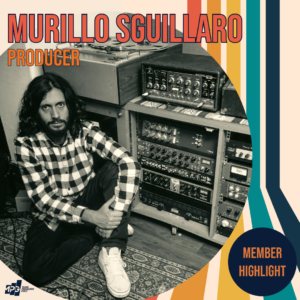 Please tell us a bit about your background and how you got into the music industry
Please tell us a bit about your background and how you got into the music industry
I am originaly from São Paulo, Brazil. I have played guitar since the age of twelve years old and always wanted to become a musician.
I got a job as a runner in a music studio back in Brazil and started moving up the ladder. After working there for four years, I wanted to expand my music and connection, so I moved to London in 2009 and never left. As I literally didn’t know anyone here, I started a course at London Music School in Audio Technology, to make some connections. They also run London Recording Studios (former SARM East). After one and a half years of doing some sessions and covering the main engineer, I ended up becoming the In-House Engineer till the studio closed down, I also was one of the lead teachers at London Music School for over 10 years.
I also set up my music studio, The Secret Warehouse of Sound, where I have been working with several artists and musicians over the years, as well as working on my personal music.
What was your path to becoming a producer/engineer?
Fun enough the engineering/producing side of things came completely by accident. As I was struggling to make a life as a musician in the early 20’s I had to find a job. There was this great studio in Brazil I got a connection with someone and went to visit the premises Even knowing that would be very unlikely to get a job there, I told the manager I was very reliable and would do anything, from cleaning toilets, parking cars, serving coffees to be there. I had zero experience with any tech, or engineering side of things, but I guess when they needed me I was always available and things came naturally from the runner to studio assistant, sound editor, recording engineer, mixing engineer/producer (and endless hours at the studio, normally a 12-hour shift per day sometimes 04 weeks in a row!).
What or who inspired you to follow this path?
Especially the production side of things always pleased me. I’ve always liked to give music direction to bands since I started, but then I didn’t have any knowledge. being in the studio especially back in Brazil with top-of-the-game engineers and producers was an invaluable experience and the deepest learning curve I had in my life. Being part of the songwriting side of things, helping with arrangements, giving artistic advice and working with raw talent is something I love doing and seeing some of them achieving their goals is something to be proud of.
What’s your proudest music-based achievement to date?
After years of working on English-style music, I felt the urge to revisit some of my roots and found the bossa nova one of the best and most special music examples. I then worked with Brazilian bossa master Roberto Menescal, who recorded two tracks I wrote and produced. That was a masterclass and we’re now working on a big project, making a fusion of bossa and bringing world-class singers to the project. Like Santana’s Supernatural album, with Brazilian and bossa influences with a modern approach
What one tip can you share with other MPG members that could help their workflow?
For mixing, have a template. Back in the day, I wasn’t a fan as I thought it would make you lazy, but I’ve completely changed my mind. I’ve worked on so many songs and projects in the end that I’ve created (and still do) my own sound signature. And making it faster to access those is extremely important, especially with budgets nowadays. Also, make deadlines. Music is so over the place now as everyone is independent it’s very easy to get sidetracked. So, make deadlines and try to follow as much as possible.
What one tip would you like an MPG member to share with you?
So many. Be kind and respectful to people, but don’t let people take advantage of you.
Also, don’t get too hyped on gear, it’s a serious addiction and a way of bankruptcy. Sometimes having a croissant and a fruit in the studio makes clients come back to work with you more than having a £10k microphone in their vocal chain.